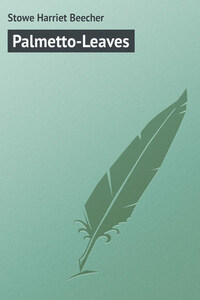YES, here he comes again! Look at him! Whose dog is he? We are sitting around the little deck-house of the Savannah steamer, in that languid state of endurance which befalls voyagers, when, though the sky is clear, and the heavens blue, and the sea calm as a looking-glass, there is yet that gentle, treacherous, sliding rise and fall, denominated a ground-swell.
Reader, do you remember it? Of all deceitful demons of the deep, this same smooth, slippery, cheating ground-swell is the most diabolic. Because, you see, he is a mean imp, an underhanded, unfair, swindling scamp, who takes from you all the glory of endurance. Fair to the eye, plausible as possible, he says to you, "What's the matter? What can you ask brighter than this sky, smoother than this sea, more glossy and calm than these rippling waves? How fortunate that you have such an exceptionally smooth voyage!"
And yet look around the circle of pale faces fixed in that grim expression of endurance, the hands belonging to them resolutely clasping lemons, – those looks of unutterable, repressed disgust and endurance. Are these people seasick? Oh, no! of course not. "Of course," says the slippery, plausible demon, "these people can't be sick in this delightful weather, and with this delightful, smooth sea!"
But here comes the dog, now slowly drooping from one to another, – the most woe-begone and dejected of all possible dogs. Not a bad-looking dog, either; not without signs about him of good dog blood.
We say one to another, as we languidly review his points, "His hair is fine and curly: he has what might be a fine tail, were it not drooping in such abject dejection and discouragement. Evidently this is a dog that has seen better days, – a dog that has belonged to somebody, and taken kindly to petting." His long nose, and great limpid, half-human eyes, have a suggestion of shepherd-dog blood about them.
He comes and seats himself opposite, and gazes at you with a pitiful, wistful, intense gaze, as much as to say, "Oh! do you know where HE is? and how came I here? – poor, miserable dog that I am!" He walks in a feeble, discouraged way to the wheel-house, and sniffs at the salt water that spatters there; gives one lick, and stops, and comes and sits quietly down again: it's "no go."
"Poor fellow! he's thirsty," says one; and the Professor, albeit not the most nimble of men, climbs carefully down the cabin-stairs for a tumbler of water, brings it up, and places it before him. Eagerly he laps it all up; and then, with the confiding glance of a dog not unused to kindness, looks as if he would like more. Another of the party fills his tumbler, and he drinks that.
"Why, poor fellow, see how thirsty he was!" "I wonder whose dog he is?" "Somebody ought to see to this dog!" are comments passing round among the ladies, who begin throwing him bits of biscuit, which he snaps up eagerly.
"He's hungry too. Only see how hungry he is! Nobody feeds this dog. Whom does he belong to?"
One of the ship's stewards, passing, throws in a remark, "That dog's seasick: that's what's the matter with him. It won't do to feed that dog; it won't: it'll make terrible work."
Evidently some stray dog, that has come aboard the steamer by accident, – looking for a lost master, perhaps; and now here he is alone and forlorn. Nobody's dog!
One of the company, a gentle, fair-haired young girl, begins stroking his rough, dusty hair, which though fine, and capable of a gloss if well kept, now is full of sticks and straws. An unseemly patch of tar disfigures his coat on one side, which seems to worry him: for he bites at it now and then aimlessly; then looks up with a hopeless, appealing glance, as much as to say, "I know I am looking like a fright; but I can't help it. Where is HE? and where am I? and what does it all mean?"
But the caresses of the fair-haired lady inspire him with a new idea. He will be "nobody's dog" no longer: he will choose a mistress.
From that moment he is like a shadow to the fair-haired lady: he follows her steps everywhere, mournful, patient, with drooping tail and bowed head, as a dog not sure of his position, but humbly determined to have a mistress if dogged faith and persistency can compass it. She walks the deck; and tick, tick, pitapat, go the four little paws after her. She stops: he stops, and looks wistful. Whenever and wherever she sits down, he goes and sits at her feet, and looks up at her with eyes of unutterable entreaty.
The stewards passing through the deck-house give him now and then a professional kick; and he sneaks out of one door only to walk quietly round a corner and in at the other, and place himself at her feet. Her party laugh, and rally her on her attractions. She now and then pats and caresses and pities him, and gives him morsels of biscuit out of her stores. Evidently she belongs to the band of dog-lovers. In the tedious dulness of the three-days' voyage the dog becomes a topic, and his devotion to the fair-haired lady an engrossment.
We call for his name. The stewards call him "Jack: " but he seems to run about as well for one name as another; and it is proposed to call him "Barnes," from the name of the boat we are on. The suggestion drops, from want of energy in our very demoralized company to carry it. Not that we are seasick, one of us: oh, no! Grimly upright, always at table, and eating our three meals a day, who dares intimate that we are sick? Perish the thought! It is only a dizzy, headachy dulness, with an utter disgust for every thing in general, that creeps over us; and Jack's mournful face reflects but too truly our own internal troubles.













